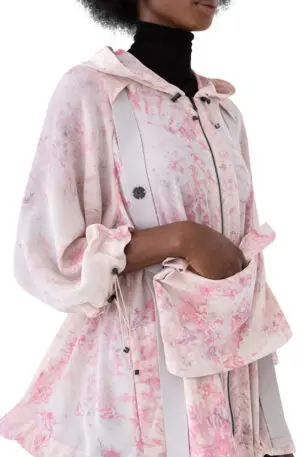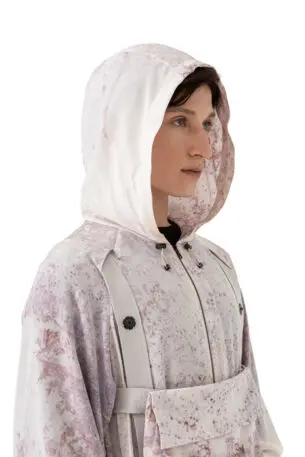It started with scarves dyed by bacteria in a lab. Now, Normal Phenomena of Life is a luxury online store offering fashion, beauty, and lifestyle products created with microbes. Call it haute coulture.
The store’s first products include face oil derived from fungi ($80), prints enhanced by algal ink ($245), and the company’s signature Exploring Jacket ($4,895), colored by Streptomyces coelicolor. These items are all available for purchase in the U.K.

NPOL is a joint project between the U.K.-based biodesign research studio Faber Futures, founded by Natsai Audrey Chieza, and the creative director of Ginkgo Bioworks, Christina Agapakis. Their store, announced at the London Design Festival in September, is opening just weeks after Paris Fashion Week, one of the industry’s biggest biannual events. Amid the city’s bed bug horror stories, the event reignited discussions about the fashion sector’s global footprint and the disproportionate impact its practices have on the climate crisis.

NPOL wants to be a hub for a new, more sustainable kind of industry—one that combines design and biology. A desire to find and create a connection between the two fields initially brought Chieza and Agapakis together.
“We couldn’t really pinpoint any products that existed that could fit in the world that we were envisioning at the time,” Chieza says. It quickly became apparent that in order to attract interest in biologically engineered products, Chieza and Agapakis needed to create a platform that celebrated these pieces themselves.
And that platform needed to be more than just a store. Chieza and Agapakis found there was no blueprint for turning microbes into wearable products. They soon realized that they would be responsible not only for the design aspects of the process but also for building out the entire supply chain for goods NPOL sells.

“What started off as ‘let’s design a shop’ was very quickly ‘okay, we’re actually building a product development pipeline for biotech-enabled products,’” Chieza says, explaining that NPOL effectively becomes a customer of the companies developing the technologies that produce the store’s offerings.

NPOL’s products, which are created through naturally occurring practices like bacterial fermentation, are inherently one of a kind. The pattern on an item like the Exploring Jacket is determined by how a particular set of bacteria interacts with a particular piece of fabric, which fits directly into Chieza’s vision. She wants to challenge traditional approaches to clothing production, which place a high emphasis on excess and the ephemerality of trends.

“The petroleum age was about centralizing manufacturing, it was about high volume, homogenous materials,” Chieza explains. “We have very specific expectations about how materials should behave when they’re made that way.”
By engaging with natural practices, NPOL is creating high-quality pieces with a much lower carbon footprint. Less water is used to dye bacteria in comparison to traditional practices, as bacteria grows in a lab setting and does not require farmland, unlike the plants that are used for the same purpose.
Because the companies that NPOL partners with are producing difficult-to-scale materials, the brand has a limited quantity of product that it is offering at a high price point.
Chieza says that for now, NPOL’s products are geared toward a luxury consumer who is interested in sustainability and concerned about their environmental impact. But she believes that as NPOL’s partners and processes scale, their technology and products will become more accessible.
“We want to be a place where you learn about the power of biology to decarbonize to eliminate toxic materials from supply chains, but we want that to be fun. We want that to be engaging. We want that to be aspirational. Because if we can get as many people excited about that as possible, that grows the demand,” Chieza says. “It’s not just lab coats and petri dishes. It’s all of us, actually.”
Recognize your brand’s excellence by applying to this year’s Brands That Matter Awards before the early-rate deadline, May 3.
